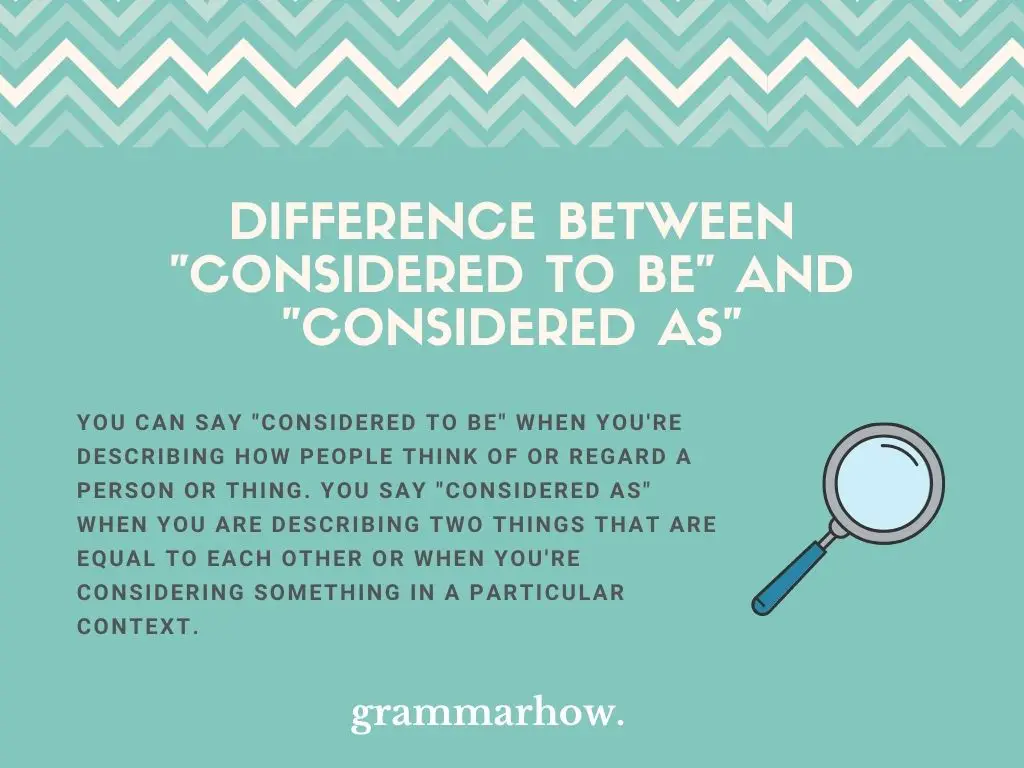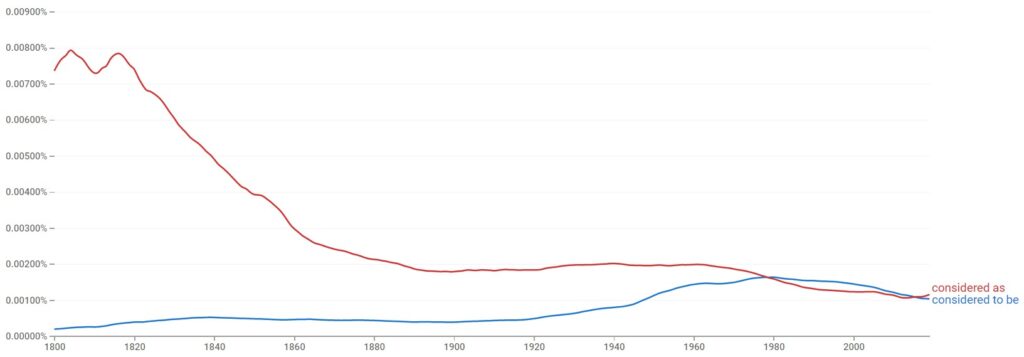The meanings of “considered to be” and “considered as” are subtly different. The differences are so subtle in fact that while native speakers may use these phrases differently, most people probably couldn’t explain the differences. It’s definitely tricky, but this article is going to shed some light on the differences.
What Is The Difference Between “Considered To Be” And “Considered As”?
You can say “considered to be” when you’re describing how people think of or regard a person or thing. You say “considered as” when you are describing two things that are equal to each other or when you’re considering something in a particular context.

Tricky, right?
The key difference here can be found in the difference between “to be” and “as.”
Considered To Be
Put most simply, “to be” is a verb used to describe the status, traits, or characteristics of something. It is a highly irregular verb, meaning it has many different forms. “Am,” “is,” “are,” “was,” and “were” are all forms of the “to be” verb.
If you say, “Lucy is considered to be an excellent chef,” you are saying that Lucy is thought of as a good chef. “To be” here is describing a trait that Lucy is thought to have.
A key feature of the “considered to be” phrase is that the description it gives may or may not be factually correct. In the above example, we don’t know whether or not Lucy is an excellent chef; we only know that people think she is an excellent chef.
Considered As
“As” can be used in many different ways. It has two primary meanings relevant to “considered as:”
- To compare two things that are considered to be the same or similar
- To consider something in a specific form, context, or relationship
If you say, “Lucy is considered as excellent a chef as her mentor,” you are saying that Lucy’s cooking skills are on the same level as her mentor.
If you say, “Lucy is being considered as an excellent chef,” you are saying that people are considering labeling Lucy as an excellent chef.
Examples Of How To Use “Considered To Be” In A Sentence
Here are some more examples to help you get a better grasp on how to use “considered to be.”
- Mary Shelley’s “Frankenstein” is considered to be one of the greatest horror novels of all time.
- Mr. Reed is considered to be one of the best teachers in the state.
- Swimming is considered to be excellent exercise.
In the above examples, “considered to be” is describing a characteristic the subject of the sentence is thought to have.
Examples Of How To Use “Considered As” In A Sentence
Here’s how you can use “considered as” to liken two things:
- Jogging on a treadmill is considered as good as jogging outside.
- Reading is considered as crucial as listening when it comes to learning a foreign language.
Here’s how you can use “considered as” to think of something in a specific context:
- Max wrote an essay titled, “Football Considered as a Science.”
- The old mansion is being considered as a historical landmark.
In both uses, “considered as” compares two things.
Can “Considered” Be Used Instead Of “Considered To Be” And “Considered As”?
“Considered” can almost always be used instead of “considered to be.” However, it can only replace “considered as” sometimes.
Let’s look at some of the examples above. “Lucy is considered to be an excellent chef,” can be written as, “Lucy is considered an excellent chef.” These two sentences have the same meaning and both sound natural to a native speaker.
Looking at the “considered as” examples: you can’t remove the “as” clause from “Lucy is considered as excellent a chef as her mentor,” or “Lucy is being considered as an excellent chef,” and retain the same meaning.
You may sometimes see statements like “He is considered as a smart person,” or “They are considered as successful people.” Here, “considered as” is describing a trait of the subject. So it’s doing the exact same thing “considered to be” does.
Using “considered as” in this way can be natural depending on where you are, but is less common than saying “considered” or “considered to be.”
With that in mind, “considered” can only be used instead of “considered to be” and “considered as” if the “considered” clause is describing a particular trait of the subject of the sentence.
- I am considered (to be) an excellent singer.
- My mom is considered (to be) the best baker in the city.
- That grocery store is considered (to be) expensive.
Keep in mind that while “considered” can often replace “considered to be” and “considered as,” there are situations where you can only use “considered.”
If you’re describing someone thinking about something, you can only use “considered.”
- I considered his argument carefully.
- He rarely considered his words.
- He has considered the consequences of his decision, he might have chosen differently.
Since the subject in the above examples is thinking about something rather than being described with a particular characteristic, you cannot replace “considered” with “considered to be” or “considered as.” It wouldn’t make any sense.
How Prevalent Is The Use Of “Considered To Be” And “Considered As”?
We’re going to see if there is a significant difference in how often “considered to be” and “considered as” are used in English.
According to Google Ngram Viewer, “considered as” is marginally more common than “considered to be.”This makes sense, as “considered as” has more unique uses than “considered to be” does.

You might notice that “considered as” used to be significantly more common than “considered to be.” You may also notice that for several decades in the 20th century, “considered to be” was slightly more common than “considered as.”
This shows us that as time has gone on, “considered to be” and “considered as” have become nearly equally prevalent. Native speakers will recognize and understand both phrases.
“Considered” – Synonyms
Here are some words you can use in place of “considered.”
- Regarded: She is regarded as a top athlete.
- Though: Getting fresh air every day is thought to be good for you.
- Thought about: I never thought about how my actions might have hurt the team.
- Entertained: I entertained the possibilities.
- Contemplated: I carefully contemplated what I would do next.
